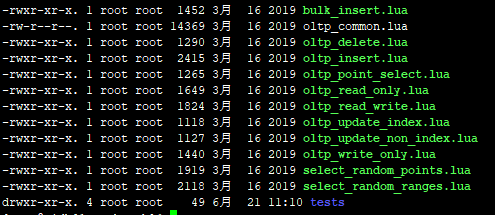TiUP is a cluster operation and maintenance tool introduced in version 4.0 of TiDB. TiUP cluster is a cluster management component written by Golang provided by TiUP. Through TiUP cluster component, you can carry out daily operation and maintenance work, including deployment, startup, shutdown, destruction, elastic capacity expansion, upgrading TiDB cluster, and managing TiDB cluster parameters. At present, TiUP can support the deployment of TiDB, TiFlash, TiDB Binlog, TiCDC and monitoring system.
Recommended server configuration
Development and test environment
assembly CPU Memory Local storage network Number of instances(minimum requirements ) TiDB 8 nucleus+ 16 GB+ No special requirements Gigabit Ethernet 1(Can be associated with PD Same as machine) PD 4 nucleus+ 8 GB+ SAS, 200 GB+ Gigabit Ethernet 1(Can be associated with TiDB Same as machine) TiKV 8 nucleus+ 32 GB+ SSD, 200 GB+ Gigabit Ethernet 3 TiFlash 32 nucleus+ 64 GB+ SSD, 200 GB+ Gigabit Ethernet 1 TiCDC 8 nucleus+ 16 GB+ SAS, 200 GB+ Gigabit Ethernet 1
production environment
assembly CPU Memory Hard disk type network Number of instances TiDB 16 nucleus+ 32 GB+ SAS 10 Gigabit network card (2 best) 2 PD 4 nucleus+ 8 GB+ SSD 10 Gigabit network card (2 best) 3 TiKV 16 nucleus+ 32 GB+ SSD 10 Gigabit network card (2 best) 3 TiFlash 48 nucleus+ 128 GB+ 1 or more SSDs 10 Gigabit network card (2 best) 2 TiCDC 16 nucleus+ 64 GB+ SSD 10 Gigabit network card (2 best) 2 monitor 8 core+ 16 GB+ SAS Gigabit Ethernet 1
Deploy TiUP components Online
Select a server as the master computer to perform the following operations:
1. Install the TiUP tool
curl --proto '=https' --tlsv1.2 -sSf https://tiup-mirrors.pingcap.com/install.sh | sh
2. Set the TiUP environment variable
source .bash_profile
3. Confirm whether the TiUP tool is installed
which tiup
4. Install the TiUP cluster component
tiup cluster
5. If installed, update the TiUP cluster component to the latest version
tiup update --self && tiup update cluster
6. Verify the current TiUP cluster version information
tiup --binary cluster
Set ssh password free login
The client of the master computer generates a public-private key: (all the way enter is the default)
ssh-keygen
Upload public key to other servers
ssh-copy-id -i ~/.ssh/id_rsa.pub root@192.168.1.xxx
test
ssh root@192.168.1.xxx
Edit the cluster topology file and start the cluster
File name: topology Yaml, configuration reference only
global: user: "tidb" ssh_port: 22 deploy_dir: "/tidb-deploy" data_dir: "/tidb-data" pd_servers: - host: 192.168.1.1 tidb_servers: - host: 192.168.1.1 tikv_servers: - host: 192.168.1.2 - host: 192.168.1.3 - host: 192.168.1.4 tiflash_servers: - host: 192.168.1.5 cdc_servers: - host: 192.168.1.6 monitoring_servers: - host: 192.168.1.1 grafana_servers: - host: 192.168.1.1 alertmanager_servers: - host: 192.168.1.1
Execute the deploy command
Before executing the deploy command, first use the check and check --apply commands to check and automatically repair the potential risks of the cluster
tiup cluster check ./topology.yaml --user root [-p] [-i /home/root/.ssh/gcp_rsa]
tiup cluster check ./topology.yaml --apply --user root [-p] [-i /home/root/.ssh/gcp_rsa]
Then execute the deploy command to deploy the TiDB cluster
tiup cluster deploy tidb-test v5.0.2 ./topology.yaml --user root [-p] [-i /home/root/.ssh/gcp_rsa]
View the cluster managed by TiUP
tiup cluster list
Check the deployed TiDB cluster
tiup cluster display tidb-test
Start cluster
tiup cluster start tidb-test
Log directory
/tidb-deploy/tikv-20160/log
Change Password
The default password of tidb is empty. To change the password, you need to find a machine with mysql client
mysql -h 192.168.1.1 -P 4000 -u root
ALTER USER 'root' IDENTIFIED BY 'root';
flush privileges ;
quit
Capacity expansion
tiup cluster scale-out tidb-test scale-out.yaml
Volume reduction
tiup cluster scale-in tidb-test --node 192.168.1.xxx:<ID>
It takes some time to go offline. If the status of the offline node changes to Tombstone, it indicates that the offline is successful.
Uninstall cluster
tiup cluster destroy tidb-test --force
Performance testing using sysbench
Update epel third party software library
yum install -y epel-release
Installing the sysbench tool
yum install -y sysbench
The benchmark script is in the / usr/share/sysbench directory

Generate test table
sudo sysbench --db-driver=mysql --mysql-host=192.168.1.xxx --mysql-port=4000 \ --mysql-user=root --mysql-password=root --mysql-db=bigdata \ --range_size=100 --table_size=100000 --threads=2 --events=0 --time=60 \ --rand-type=uniform /usr/share/sysbench/oltp_read_only.lua prepare
Run the statement to test (the reading performance statistics of the table is 100000 based on the data of the table)
sudo sysbench --db-driver=mysql --mysql-host=192.168.1.xxx --mysql-port=4000 \ --mysql-user=root --mysql-password=root --mysql-db=bigdata \ --range_size=100 --table_size=100000 --threads=2 --events=0 --time=60 \ --rand-type=uniform /usr/share/sysbench/oltp_read_only.lua run
The operation results are as follows:
SQL statistics:
queries performed: #Performance statistics
read: 32018 # Read Statistics (select statement)
write: 0 # Write Statistics (insert, delete, update statements)
other: 4574 # Other statements (such as commit)
total: 36592 # Sum of total executed statements
transactions: 2287 (226.03 per sec.) #Total transactions (transactions processed per second)
queries: 36592 (3616.44 per sec.) #Query performance (query performance per second)
ignored errors: 0 (0.00 per sec.)
reconnects: 0 (0.00 per sec.)
General statistics:
total time: 10.1123s # Total time
total number of events: 2287 # Total transactions
Latency (ms): #delay time
min: 107.13 # Minimum delay time
avg: 140.78 # Average delay
max: 268.09 # Maximum delay
95th percentile: 161.51 # More than 95% statement response time
sum: 321960.64 # Total delay duration
Threads fairness: # Thread fairness
events (avg/stddev): 71.4688/0.61
execution time (avg/stddev): 10.0613/0.04Clear test table
sudo sysbench --db-driver=mysql --mysql-host=192.168.1.xxx --mysql-port=4000 \ --mysql-user=root --mysql-password=root --mysql-db=bigdata \ --range_size=100 --table_size=100000 --threads=2 --events=0 --time=60 \ --rand-type=uniform /usr/share/sysbench/oltp_read_only.lua cleanup
Reference address: https://docs.pingcap.com/zh/tidb/stable/production-deployment-using-tiup